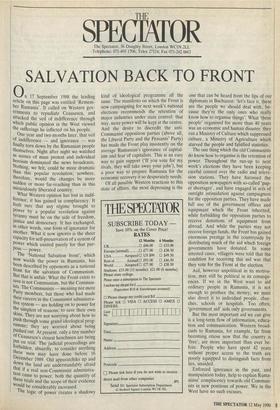The Spectator, 56 Doughty Street, London WC1N 2LL Telephone: 071-405
1706; Telex 27124; Fax 071-242 0603
SALVATION BACK TO FRONT
On 17 September 1988 the leading article on this page was entitled 'Remem- ber Rumania'. It called on Western gov- ernments to repudiate Ceausescu, and attacked the veil of indifference through which public opinion in the West viewed the sufferings he inflicted on his people. One year and two months later, that veil of indifference — and ignorance — was finally torn down by the Rumanian people themselves. Night after night we watched as scenes of mass protest and individual heroism dominated the news broadcasts. Nothing, we felt, could be more dramatic than this popular revolution; nowhere, therefore, would the changes be more sudden or more far-reaching than in this miraculously liberated country.
What Western opinion has lost in indif- ference, it has gained in complacency. It feels sure that any regime brought to power by a popular revolution against tyranny must be on the side of freedom, justice and democracy. It has exchanged, in other words, one form of ignorance for another. What it now ignores is the sheer capacity for self-preservation of a system of Power which existed purely for that pur- Pose — power.
The 'National Salvation front', which now wields the power in Rumania, has been described by opponents as a national front for the salvation of Communism. But that is unfair. What the Front exists to save is not Communism, but the Commun- ists. The Communists — meaning not mere Party members, but those who had made their careers in the Communist administra- tive system — are holding on to power for the simplest of reasons: to save their own skins. They are not worrying about how to Push through some grand ideological prog- ramme; they are worried about being pushed out. At present, only a tiny number of Ceausescu's closest henchmen are being put on trial. The judicial proceedings are forbidden, absurdly, to consider anything these men may have done before 16 December 1989. Old apparatchiks up and down the land are understandably afraid that if a real non-Communist administra- tion came to power, both the quantity of these trials and the scope of their evidence Would be considerably increased.
The logic of power creates a shadowy kind of ideological programme all the same. The manifesto on which the Front is now campaigning for next week's national elections recommends the retention of major industries under state control: that way, more power will be kept at the centre. And the desire to discredit the anti- Communist opposition parties (above all, the Liberal Party and the Peasants' Party) has made the Front play insistently on the average Rumanian's ignorance of capital- ism and fear of capitalists. This is an easy way to gain support (If you vote for my rivals, they will take away your jobs'), but a poor way to prepare Rumania for the economic recovery it so desperately needs.
Of all possible Western reactions to this state of affairs, the most depressing is the
one that can be heard from the lips of our diplomats in Bucharest: 'let's face it, these are the people we should deal with, be- cause they're the only ones who really know how to organise things'. What 'these people' organised for more than 40 years was an economic and human disaster: they ran a Ministry of Culture which suppressed culture, a Ministry of Agriculture which starved the people and falsified statistics.
The one thing which the old Communists do know how to organise is the retention of power. Throughout the run-up to next week's elections they have been keeping careful control over the radio and televi- sion stations. They have harassed the opposition newspapers with so-called 'pap- er shortages', and have engaged in acts of outright intimidation against campaigners for the opposition parties. They have made full use of the government offices and equipment which the Front inherited, while forbidding the opposition parties to receive donations of equipment from abroad. And while the parties may not receive foreign funds, the Front has gained enormous prestige in the countryside by distributing much of the aid which foreign governments have donated. In some attested cases, villagers were told that the condition for receiving this aid was that they vote for the Front at the election.
Aid, however unpolitical in its motiva- tion, may still be political in its consequ- ences. If we in the West want to aid ordinary people in Rumania, it is not enough to produce the money; we must also direct it to individual people, chur- ches, schools or hospitals. Too often, `government aid' aids only governments.
But the most important aid we can give is a long-term flow of information, educa- tion and communication. Western broad- casts to Rumania, for example, far from becoming otiose now that the country is 'free', are more important than ever be- fore. People who have spent 42 years without proper access to the truth are poorly equipped to distinguish facts from lies, unaided.
Enforced ignorance in the past, and manipulation today, help to explain Ruma- nians' complacency towards old Commun- ists in new positions of power. We in the West have no such excuses.




























































 Previous page
Previous page